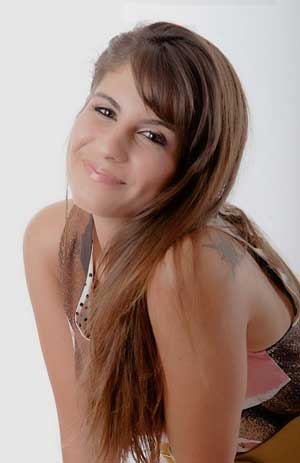Photographer Hanna Kluner’s Special Project: Our Exclusive Interview, Part II
Through a unique project, photographer Hanna Kluner strives to help women with eating disorders discover their inner beauty. As a photographer and yoga therapist, she has helped women reconnect with their bodies.
In this two-part interview with EatingDisorders.com, Hanna shares how and why she created the project and the impact of the photos on her subjects.
Where do you photograph your subjects?
I have a yoga studio in my house where I do my work, so I also use it as a photography studio.
You also posed in front of the camera yourself. What was that experience like?
I really felt if I was going to be doing this work I needed to experience the same thing on the other side of the camera so I know what things come up. So even though I saw and I was comfortable with my body and didn’t think I had body image issues, when the focus is on you all this stuff comes up. Going through the process, a lot of my own inhibitions or shyness or wanting to look good in front of the camera – all of those things showed up for me and I was really surprised. But I also got to the other side that these girls get through and that through the process – when you stay with it – something happens when you forget about your body and you tap into the essence of yourself. That becomes so much larger and so much more important and so much more real. That’s when the beauty is exuded, when you are really connected to your natural self … I feel really happy I did that myself as well.

What’s the biggest lesson you’ve learned?
Every woman is beautiful and when she owns that about herself – when she owns her true self – then that is beauty. That to me is just so much more real than being fixated on parts of the body.
I asked these women to journal the whole process, so I asked them to journal from the time I first asked them to be photographed what came up for them, what thoughts came up, so they could really bring awareness to all the judgment. So they did that and then I had them journal the process of being photographed and what happened during the process. They started right in it and moved on to something and something else, and I asked them to journal how they felt when they looked at the images. During the photoshoot itself I had the women bring their own music that they really liked and we usually start off the session – I create the yoga session as a sacred space.
I start with an intention and a meditation to prepare to drop into and connect with the self, and I really try to create an open space so they get to bring whatever clothes they want to represent what they are. I asked them to bring four of five different outfits, so that tends to be a lot of fun. Sometimes I work with a makeup artist or hair person so they really feel pampered or like a model for the day. We’ll use their music or my music, and I’ll interact with them and we’ll talk and have fun, and I’ll try for them not to feel like they’re in front of the camera even though they are in front of the camera.
And at some point that shyness or needing to be perfect drops away and they realize that they’re doing this for themselves. When they let go of ‘What’s the end product going to be?’ or ‘What are people going to say?’ – when they think it doesn’t matter how its going to come out, it’s the experience of the day that is really impactful in its own right. Even if they never saw the images, there is something transformative that happens in the process. It’s a fun process and a fun day. At the end we had an integration and saw how it went, and a lot of them said, “I can’t believe it, but I totally forgot about my body.”
Do you have any advice for girls suffering from eating disorders, especially in taking the focus away from their bodies?
Everybody’s healing is so individual, and I believe that’s what under every eating disorder is a lack of self-love. So finding ways to increase self-love I believe is key.
Do you plan on continuing this project?
Yes, absolutely. This work is open, and I hope for it to expand in bigger ways and different avenues. I want to expand it to include body image not just ED. Almost every woman has body image issues and also maybe [extend] to women who are survivors of breast cancer as a way to reconnect to themselves as a woman. But, yes, I feel this is only the beginning. I would love to see this work grow.
What I see different about using photography with eating disorders or using it as a healing modality is that its healing through joy and that’s what I love. These girls are in treatment centers and outpatient clinics, and its really hard work healing and recovering from an ED and this is a fun way. This is like healing through joy.
You’ve photographed models in the past. How is this project different?
It’s a whole different intention. There’s something more sacred about this work.
Visit Hanna’s website to learn more about the project and click here to read about her healing practices.
 Eating Disorder Self Test. Take the EAT-26 self test to see if you might have eating disorder symptoms that might require professional evaluation. All answers are confidential.
Eating Disorder Self Test. Take the EAT-26 self test to see if you might have eating disorder symptoms that might require professional evaluation. All answers are confidential.